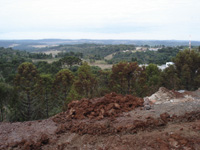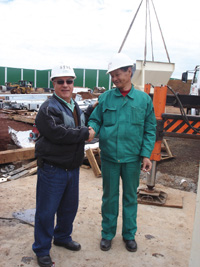Two opt for China
10 December 2008The move to MDF has emerged as producers in Brazil’s still large, but fragmented, plywood industry have seen their profits shrink over recent years, mainly thanks to a devalued US dollar. Meanwhile, they have watched the market for MDF and medium density particleboard (MDP) grow strongly.
Many smaller, family-run plywood firms, unprepared for the setback, keeled over and perished. Some initially switched to softwood plywood manufacture, later closing. But, others, eager to survive, saw evolution through upgrading to more sophisticated panels as the way forward.
The producers’ shift towards MDF was stimulated by the appearance of efficient, relatively low-cost Chinese-built MDF and MDP lines, as well as by fresh availability of credit in Brazil, according to Henrique Zanin of the Brazilian consultancy Organon Consultoria e Engenharia.
Among those plywood producers leading the switch are two companies, both based at Palmas in southern Paraná state, independent, but linked through family ties. They are Indústria de Compensados Guararapes Ltda and Indústria de Compensados Sudati Ltda.
Each firm opted to launch a 180,000m3/year multi-opening fibreboard line from the Chinese supplier Shanghai Wood Based Panel Machinery Co Ltd (SWPM) and both plants have been taking shape in Brazil’s Santa Catarina state: Guararapes in Caçador and Sudati in Otacilio Costa.
With Brazil’s panel industry still in the grip of a continuing raw material crisis and the forest resources of Paraná already exploited by the big panel makers, the newcomers chose to locate further south in still relatively timber-rich Santa Catarina.
In July this year (2008), WBPI took the opportunity, while in Brazil, to fly to the Santa Catarina town of Caçador to see progress being made by Guararapes on its MDF project first-hand.
The firm originally aimed to complete its new plant by mid-2008, but assembly only began on site in May and construction has been delayed by high winds and heavy rain in recent months. The revised plan now sees the plant start-up in December 08 or January 09, a little over a month after that of Sudati, Guararapes’ general manager Mariano Dantur Do Canto forecast in late October.
Guararapes’ Chinese machinery arrived at the Santa Catarina port of Itajaí aboard a single ship at the end of April. The equipment was ferried in 179 truck loads to the site in the state’s interior. Meanwhile, a team of Brazilian construction workers shifted some 350,000m3 of soil in the major task of levelling the hill-top industrial site.
By July, the company’s fibreboard offshoot, Guararapes Panéis Ltda already had its SWPM board line installed in a 14,000m2 production hall. Work was continuing apace outside to erect the Chinese-supplied wood processing equipment, including the 4m diameter drum debarker, 100 tonne per hour disc chipper, a biomass silo and a Brazilian-made chip silo.
Engineers from Austrian refiner supplier Andritz AG were due to finish assembling the new line’s refiner system – one of only two main sections not supplied by the Chinese – by September. In the meantime, Guararapes planned to complete erection of the energy plant.
Shanghai Wood Based Panel Machinery, part of the Kronospan Group, supplied Guararapes with a 400m3/day 12-daylight batch press MDF line with a nameplate annual capacity of around 144,000m3. But the panel maker has its sights set on bigger output.
“We know we can take [capacity] up to more than 500m3/day, gradually, depending on market demand, so we modified the [basic] Chinese line,explained Guararapes Panéis’ general manager.
One section of the line to be modified is the chip silo. SWPM could only provide a small capacity unit of 1,000m3, equipped with hydraulic pushers to move the chips. Guararapes chose instead to buy a 6,000m3 silo with a screw system from a Brazilian supplier, said Mr Dantur Do Canto, former production manager at Porto Alegre-based Fibraplac Chapas de MDF Ltda.
The panel line, which includes a pre-press and Steinemann sanding section, will produce raw boards of 1.92x5.55m.
Last year, Mr Dantur Do Canto and Sudati’s general manager spent two weeks in China with SWPM, a trip which included a four-hour flight to western China to view two of the supplier’s lines in operation. They visited Jiangxi Green Continent Woodbased Panel Co Ltd in Jian city, Jiangxi province.
The Brazilians were impressed by what they saw – not least the finish of the sanded panels produced, in spite of the poor quality raw material being used there.
When WBPI visited the Guararapes site, Chinese personnel were still overseeing the unpacking and assembly of components from shipping crates. One engineer was responsible for outside equipment, while another dealt with the panel line itself and a chief engineer took overall charge.
The SWPM line will turn out 100% pine based MDF panels, initially with a sanded finish. Guararapes expects no shortage of wood from around Caçador, with chips acquired from numerous sawmills within a 40 km radius, while roundwood will be trucked in from up to 100km away.
Although Brazil’s panel sector is in the midst of a new wave of capacity expansion, Mr Dantur Do Canto is confident his firm, albeit a small MDF newcomer, will increase its share of the country’s sizeable furniture market.
Not only that, but the executive agrees with suggestions that local MDF manufacturers could exploit new markets beyond that of furniture. He admits small Brazilian MDF players like his could attract new niche business elsewhere.
“MDF in Brazil is barely exploited in segments such as packaging and civil construction,Organon consultant Henrique Zanin told WBPI.
“In Brazil, when one talks about MDF, one immediately thinks about the furniture sector, which is more than consolidated and over-supplied. In Europe, MDF is very strong in construction, for example for door jambs, casings and doorskins,he said, adding that such a trend should be followed in Brazil.
Organon Consultoria was alerted to the trend among Brazil’s plywood firms when in early 2007 it was asked by one company in Santa Catarina to coordinate a project to install a low pressure melamine lamination line. It turned out the firm planned to buy in MDF, from the new small MDF producers, which it would finish itself.
One potential supplier of the board was to be Maseal Industria de Compensados Ltda of Campo Grande, Mato Grosso do Sul state. Later, Organon, based in Campinas, São Paulo state, was asked to coordinate Maseal’s MDF project, which includes installing a Chinese SWPM fibreboard line, recalled Mr Zanin.
Maseal is understood to have put its scheme on hold pending success in its search for a suitable partner to join it in the investment project.
Mr Zanin believes that, despite the traditionally informal and rather dated management style of family-run plywood firms, these companies are flexible and prepared to change. One incentive to switch to MDF is that buying Chinese and integrating processes means a firm could establish an MDF/particleboard plant for one third the cost of a similar German plant, he observed.
Guararapes, with two well-invested
plywood plants in Paraná and Santa Catarina capable of making 540,000m3/year of board, aims to order a low pressure laminating line at its MDF plant, perhaps early in 2009 said its
general manager.
There is no doubt his firm is committed to MDF manufacture and, as with other plywood newcomers, will benefit from the experience brought to its new plant by Mr Dantur Do Canto and production head José Claudio Alves.

